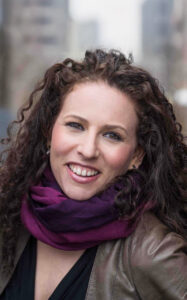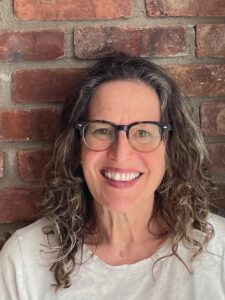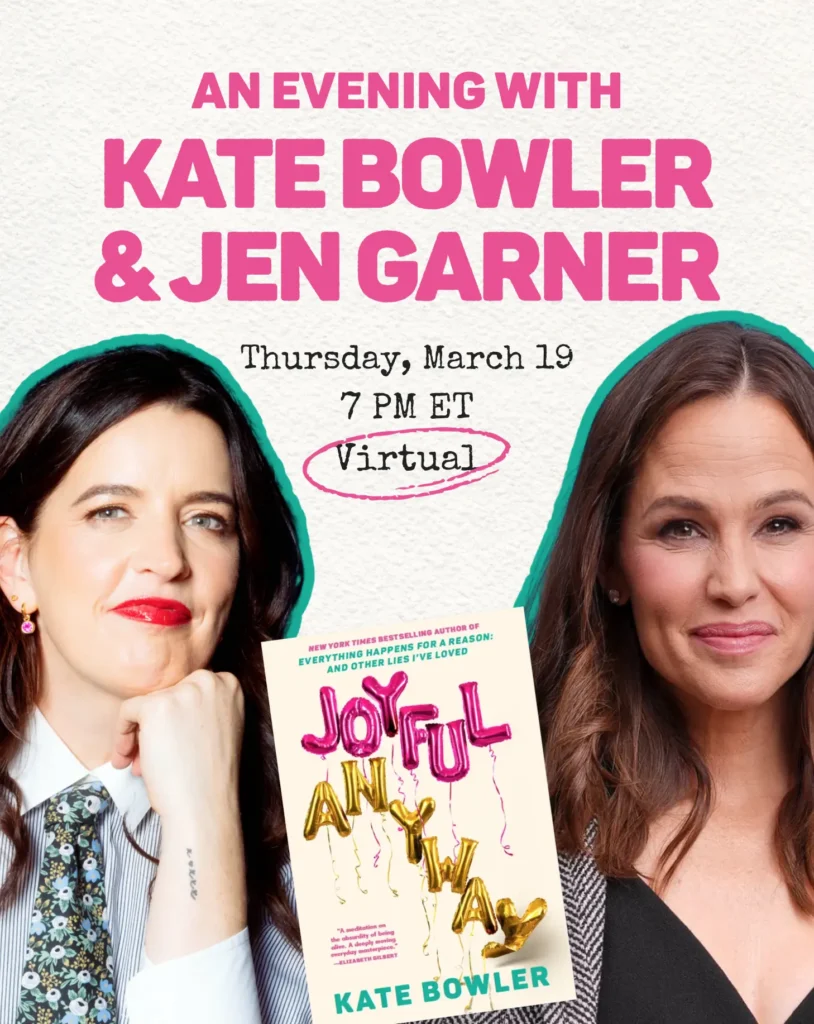Kate Bowler: Hello, my dears. Before we begin, I wanted to let you know that today’s episode talks about sensitive topics like suicide and the death of an infant. It may not be what you need for today. So here’s a little permission to be gentle with yourself.
Kate Bowler: My name is Kate Bowler, and this is Everything Happens. We need people. No, really. When life comes undone one of the best and sometimes only medicine we have is one another. Our people can help to stave off the creeping loneliness that comes when we face the unthinkable. They remind us that we are loved, loved, loved and not forgotten, even when all evidence seems to point otherwise. They help carry parts of ourselves and our chores when even getting out of bed seems to be the most we can manage in a day. Sometimes love comes in the form of fresh sheets or a home cooked meal left on your doorstep or a marathon of the show Community, even though we know we’ve both seen each episode a dozen times. When we are sick, when we are deep in grief, when we are wondering which way is up. Our people can come along side and shoulder the burden. They may not be able to fix the situation, it might be absolutely unsolvable, but there is something about that kind of love, the kind that opts in when it would be easier and less messy to opt out. That, I don’t know, heals something in us. In me. Today’s episode is for the ones who opt in, who let their hearts break alongside ours. Bless you. The Reverend Liz Tichenor is an Episcopal priest in California. Liz is no stranger to grief. In a single year, Liz lost both her mom and her baby. She writes beautifully about that grief and hope in her memoir The Night Lake a Young Priest Maps the Topography of Grief. Liz, hello. Thanks so much for doing this with me.
Liz Tichenor: Thank you.
Kate Bowler: We are maybe the only two people just who want to talk about being on team theological education more than any more than anyone we know, surely. So it makes me want to ask you what first drew you toward becoming a priest? Because I think the only obvious answer is is fashion.
Liz Tichenor: Well, yeah, there’s nothing like dressing up in vestments made for a man a foot taller than me 40 years ago to look really good. That’s what I get to do on Sundays.
Kate Bowler : Is that a woman or a human triangle? I don’t know.
Liz Tichenor: Hard to say. Yeah, there’s a little bit to be desired there, but the whole like, minimalist thing, you know, in California, I get away with it being this look that I went into my favorite pizzeria a couple of years ago in my collar and the person at the checkout counter said, I really like your priest chic look like. Thanks, I’m a priest.
Kate Bowler: Oh wow. Monastics were the early minimalists. We went for burlap.
Liz Tichenor: So it wasn’t that actually. Honestly, in some ways, I feel like I have like the best, worst luck. I heard that phrase from an author whose name I now can’t think of in describing her own, you know, constellation of tragedies growing up and whatnot. And I thought, Oh my goodness, yes. So I found my way into the Episcopal Church, and my family went for a little while when I was in middle school, and then my family unraveled more and more as I headed deeper into adolescence. Divorce and alcoholism and so forth. And I went back to church. We’d stopped going, and when I got my driver’s license, I went on my own and I looked a little different than I do now. There was lots of different shades of green and purple hair and shaved. And the church said, Fantastic, welcome. Where do you want to plug in? You want to come to this, you don’t you don’t want to go to the youth thing? That’s fine. You want to come to this adult class. Would you like to lead in this way? How about in this way? And just totally showed up and welcomed me in and were there as stable, beautiful, loving, righteous community. I mean, so at that point, I thought, oh my goodness, I need this more than anything. And what I didn’t know was that I would never need it even more and even more and even more as more of my life happened, then came undone and I had the sense then that grew over time. But I remember thinking, I want to host this for somebody else. I want to make this possible for that next ragged teenager that needs a family because her family’s not quite cutting it or whatever it is.
Kate Bowler: That’s so beautiful.
Liz Tichenor: We don’t always get it right. That’s why I feel like I have sort of the best, worst luck. In this case they really they did. Yeah, yeah.
Kate Bowler: I can’t believe you drove yourself there. You’re like the first teenager in history to drive herself to church.
Liz Tichenor: Honestly, I mean, it’s like super nerdy. I was so like, that was the thing when I got my driver’s license. I can drive myself to church. Yeah, it was really cool.
Kate Bowler: You mentioned you had a really tumultuous childhood and your mom sounds like she was a very complicated person full of laughter and love, but also brimming with a lot of pain. What was she like?
Liz Tichenor: Ah. She was incredible. I think that’s some of what makes it all so heartbreaking. She was brilliant. She just had so much love and passion and art and also a lot of pain. I think she was really lonely in some deep ways and filled that with drinking early, early on. And it was sort of manageable for quite a while until it really wasn’t. And I think that’s a story that is actually super common, that I see it coming out in so many places and it doesn’t always end with this acute tragedy. She was an alcoholic who ultimately killed herself, and it was this precise tragedy. Right. And sometimes it is, it is the same heartbreak, but it’s spread out over decades and never quite comes to that. But I think, gosh, there are so many of us who that’s part of the shape of our life, our family, our love. Yes.
Kate Bowler: It sounds like it was very sudden and very surreal.
Liz Tichenor: Yeah. Well, it was and it wasn’t. I mean, I never expected that she would kill herself. On purpose. I had braced for it, for a gnarly death related to her drinking since, I mean, since I was, gosh, seventh grade, eighth grade and there, but I didn’t think it would be on purpose. That adds a particular dimension, I think, to the grief.
Kate Bowler: Yeah. That it might happen, that it could happen or maybe would, but not like that. Yeah. I heard suicide once recently described like a state of decay instead of as a choice. I thought that was kind of a: oh, wow.
Liz Tichenor: Sort of things, things continue falling apart until they just can’t hold. Yeah.
Kate Bowler: That sounded like some stories that I know where there’s a deterioration and then there’s just, but there’s but there’s still such a surprise at losing somebody and especially losing somebody who in another circumstance, would not have chosen for it to be that. Yeah. You’re such a little baby priest. You know, you were you’re just, you know, you were just ordained, you’re like handed this job by God and a community and then you’re fresh to all of this grief that was very layered. Suicide is not something that’s very often discussed at dinner tables or in the pulpit, I imagine.
Liz Tichenor: So my tradition were ordained as deacons first and then usually about six months later as priests. And she died right in between those two ordinations. The three months before I was made a priest and my son died about a year later. On the one hand, these aren’t things we preach about, these aren’t things we talk about. And at the same time, it felt like how could I possibly be authentic and faithful and myself and pretend that this isn’t what is happening right now in my life. Yes, I definitely had not planned on this happening. I was like, that was not part of any of this was not part of the map for my life. Like because nobody does. Nobody thinks they’re going to be, I mean, who sits down and is like, I’d really like to have kids. And here are the statistics, I mean, I don’t know, maybe some people do, but I think for the most part, that’s not how we go about it. That’s not how we go about, you know, there’s this friend who I love so dearly. Am I willing to be their friend knowing that they might in two years have this horrible accident and I’ll be heartbroken? No, we just love and throw ourselves in and then sometimes it’s really awful.
Kate Bowler: And part of what I imagine feels impossible about your story is that every part of it made sense. That you are up with this baby who is a little fussy, but you already took him to the doctor and they already said he was fine. And then all of a sudden, he wasn’t breathing. And, and it was such a natural series of choices that I imagine that made the what followed seem absolutely impossible.
Liz Tichenor: And I think that’s part of what makes my story terrifying for people. Really, honestly, I will probably question my choices until the day I die. Like, if I’m just being really honest, you know, I can’t, I can’t not what if? What if I pushed harder? What if I’d gone somewhere else? But under the really terrible truth is that, yeah, it all made sense. I sought care, and the doctor said he was fine. We trusted that he was fine. And that, I think is what’s terrifying is that sometimes you can get an answer and it’s wrong, or you can buckle your seatbelt and it doesn’t matter or, you know, you take all your vitamins and still we’re not in control of that. There’s a lot that we can, you know, there’s we can control how much we choose to love and show up and. And all that, but ultimately, we’re not we’re not in control, and that’s absolutely petrifying to really sit with that.
Kate Bowler: Yes.
Liz Tichenor: Especially when we’re tasked as parents with keeping our kids healthy and safe and alive. And I really think this is offered as you know, encouragement to not worry about how filthy your house is or that your kid is only eating cheezits or whatever, but people will say your only job is to keep them alive. And what if you can’t? What if sometimes you can’t?
Kate Bowler: That’s right. That’s right. The loving baby frets, the holding him, the naturalness of that love. You’re like, you’re you’re a nursing mom, you’re one who’s like snuggling, snuggling him and then to to somehow have to walk away. The way that you tell the news to each person, the way you described it, like like each person who picks up the phone and they don’t yet know. And it sounded to me like you felt like you were almost like dropping a heavy weight on glass and watching it sort of crack under their feet.
Liz Tichenor: Hmm. There’s there’s a way in which really major tragedies or deaths or whatever. You’re both needing care and asking for support, but also so often in the position of having to support people as you tell them about the death or the diagnosis or the divorce or whatever when they’re hearing it for the first time. And of course, they’re upset when they hear it for the first time. And I think I felt that particularly then and it continues to be a really fascinating dimension of who’s supporting who and where. Where do they get what they need? Where do I get what I need to carry on sort of radar of empathy. Can you handle this? Do you want to know more?
Kate Bowler: The moment you describe in the hospital being that moment where you’re supposed to receive care, you’re supposed to get the chaplain who comes and sits with you and I mean, this is something you and I just share a horrifyingly entirely in common.
Liz Tichenor: Do you have awful chaplain experiences?
Kate Bowler: We cannot handle trite, terrible things, especially especially from Christians. It’s just it’s a rarefied kind of
Liz Tichenor: it’s so bad.
Kate Bowler: I mean, I think you described it like, well, she rounded the corner on everything happens for a reason. And then she.
Liz Tichenor: Yeah, yeah. Mm hmm. Well, I think part of why it’s so unpalatable for me is is because I know it actually does damage. It actually makes things worse. For things to be able to make something worse in a situation like yours or like mine, that’s saying something.
Kate Bowler: You described Fritz’s funeral as this communal act like you needed to be carried and you needed to bury him together. How did that beautiful way that you describe church and community as being this like group project, how did that vision kind of hold some of the weight over that terrible period?
Liz Tichenor: I think what made it work in part, was the folks leading us through all that. Two dear priests, close friends, Phil and Jeff. They they loved Fritz, you know, so dearly. You know, I in some ways I felt, not badly, but I felt for them asking them to lead this for us, knowing all that really, really hard one.
Kate Bowler: Yeah.
Liz Tichenor: But they didn’t mask how hard it was. You know, I think there’s a way in which, I mean, in some ways, church is theater. Right? And in some ways, I think that it can be antiseptic. It can have that that plexiglass between who’s leading or what’s being prayed, preached, enacted, whatever and the lived reality of people’s hearts and souls that are, you know, broken and sort of bleeding all over the place in the pews.
Kate Bowler: That’s exactly what I was picturing, yes.
Liz Tichenor: It’s just a mess. And so like, I’m sitting there in the front of this little church, you know, snot running down my face and shaking and, you know, literally being held up by my best friend on one side. But they broke that fourth wall in being wholehearted, broken hearted, tender hearted, all of it with us. And they were really explicit. This is what we’re doing together. This is not just watching Liz and Jesse burying their son. This is all of us burying our beloved child together.
Kate Bowler: Oof. Oh that’s so real.
Liz Tichenor: And it and I think the part of the gift of it that I well, I don’t think I even occurred to me then was that day was really important, but they were also teaching our whole community. This is how we’re going to be together, this is how we’re going to be for Liz and Jesse and Alice and now Sam. This is how we’re going to be for one another when the shit keeps hitting the fan for all of us. And they were they were so explicit and direct. We’re going to show up. We’re going to love them. We’re going to keep holding them. We’re going to keep remembering. And I mean, shit these people are obedient. You know, like I think, I think they really took it to, I mean, they really took it to heart. I just, and just last week, a dear friend visited who was at that funeral, and we hadn’t seen her in gosh in years. And she brought these these two stuffed sloths for Sam and for Alice. They’re super sweet. You can microwave them and they’re really soft and they smell like lavender. They’re amazing. But she also, she wrote a letter to my kids and gave it to them as she was leaving town after several really sweet days together. And she told them in this letter how, you know, I brought one for each of you, but there’s not there’s not just two of you, there’s three of you. There’s your brother is still he’s still connected. He’s still with us. We still love him. And so I’m going to make and send a third little baby sloth. So there’s three of them. And the gift of having someone else remember and teach my living kids about their brother and hold that so that it’s not just. Like she she helped bury him, but now she’s also helping to remember him and helping to teach my kids what it might mean, what it might look like to have a dead brother that is still part of our family. Yes, it’s just a huge gift.
Kate Bowler: Makes me think of the moment where in those, you know, godless traditions that don’t just baptize adults like mine. No it sounds so insane, they’re like everyone must be an adult or it does. But I am picturing that beautiful moment. I go to a Methodist church and they and after they, you know, baptized the baby that they like, carry it around to meet everybody. Then they go up and down the aisles and like the moment where they say, like, you’re part of this family and they’re here to take care of you and to just think of that as like the bookend of like this is your family like like this, is your family living and dead. This is your family loved and held, but also like remembered as a group project because no one can, no one can hold that kind of memory on their own. Such a flatness to to grief in the face of bureaucracy. You, you, you, you make this wonderful, terrible, gorgeous point about that with these, you know, these the paperwork that that people receive after death, that list their their weight and occupation and, you know.
Liz Tichenor: Occupation: newborn, you’re like, yeah?
Kate Bowler: It’s a baby! And like from the, from the you, I just felt like you were just saying, like, there’s no people in general. There’s no there’s no life in general. I mean, do you want to like, correct every single paperwork and also scour it for details that like, No, this is my mom, this is her purple nail polish. These are these are they’re beautiful, much loved selves. But that was such a gorgeous protest. It’s like every tragedy goes through these like obscure-atron, you know, and then it gets rendered into numbers, and none of it is, none of those people that we loved in the end.
Liz Tichenor: You know, I trust that people who work in funeral homes are doing the best that they can with the information that they have. They’re trying to make it, I don’t know, seem more doable, but but so like I sometimes have to argue with them that, no, we’re we’re actually going to bury these ashes like we’re going to put them in the ground and we’re going to put the dirt in on top. We’re not going to walk, they’re like what is the plan? The default often is that you go and like, say, some lovely things and maybe throw some rose petals, but then they come and put the urn in the ground and they put the dirt in. And I’m like, No, no, no, no, no, no, that we’re doing that.
Kate Bowler: So, Liz, when we do it, because that is like those, you’re like when you take the extra steps, when people like took handfuls of dirt to help you bury your baby, like what is it, what does it do when we give ourselves that permission to not have it like behind the sort of we don’t put death behind this sort of privacy curtain?
Liz Tichenor: I mean, there is so much about that afternoon that was simultaneously horrible, but also so beautiful and true. That might be the most awful thing I ever have to do. I don’t know. I’m like, so past saying, like, that was it. I’m never saying never, ever again. Been there. Really bad idea. But so far in my life that that’s the most awful thing. And yet, at the same time, all these people who I love so much came. And chose to let their hearts break more by doing this thing with me that I had to do, but they didn’t. They did not have to do it. They didn’t have to show up. They chose to come and do that. And so I did it, you know, with with convulsions and sobbing into the Earth. But then I eventually they pulled me up and pulled me back. Like Liz, Stop. Now everybody else does that. Now we do this with you, now we do this for you. And so I stood there. I had Phil and Jesse holding me up on either side while Alice is running around like she got to throw in many, many handfuls of dirt. She was really into it. But then I watched as everybody else came and did this, and I thought I thought then I think now like, gosh, this, this is what it is. This is, this is, this is so much of why we come together is. To make that choice of letting our hearts break with one another. And and it changed me then and it changed, I think, how I carry it, how I live it, because I had this concrete, this visceral experience of other people’s courage and stepping into that. Mm-Hmm.
Kate Bowler: Your, I’m not going to say invitation, your like demand that we sign up to be broken with each other I think is everything I have wanted, and certainly it’s what I love that the church like sets aside a chunk of time to force us to do that, regardless of how much we would be, I don’t know, it would just be preferable to be on the, on the sunshine side again. And you and I both love Lent that like 40 day horrible march toward Jesus’s death when like, you know, when mortality and death is like rubbed in our faces. I remember going through chemo and entering the season of Lent. I had met some very cheerful and very kind. I got to this service where Lent had been introduced by the priest as being like, Why don’t we all just do our best? And then we just like, like, like Snow White’s dwars just cheerfully head down into the mines. And meanwhile, I was like mascara streaked just like puffy, bleeding under my shirt. Just being like, no, no. This is this is the time for our team. Like, this is the time for the losing team. Where we have to all march through the valley of the shadow of death. And like, there’s something really beautiful about knowing that everyone has to be there. I mean, it’s nice when they choose, but is going to be there.
Liz Tichenor: Yeah, I remember the first Lent I had after Fritz died. I felt so relieved, like, Oh, Ash Wednesday, like, we’re all thinking about death now. Fantastic, like it felt like I had like the world that I don’t if I had caught up with the the church world or vice versa. But we could sort of be real. And I love that day. I love Ash Wednesday. I love the season generally because it feels like such sort of communal permission to get really honest in a way that I don’t know that it eludes us, but we’re really good at sidestepping it so much of the time, except when you know you have stage four cancer and your baby dies and whatever. And then like, you’re really there. But not so many people are ready to jump in with you because it’s terrifying.
Kate Bowler: And I just love it.
Liz Tichenor : Probably, I don’t know, what studies you’ve read, I know you’ve read lots of studies on all you know, like, did you know that these things are contagious like stage four cancer and dead babies, both contagious, like if you get too close like you might catch it!
Kate Bowler : That’s right.
Liz Tichenor: What if I sneeze on you?! Watch out, protect your children.
Kate Bowler : Oh gosh. Yeah, because like the rest of the time. It can feel like exile, you’re just banished with your tragedy.
Liz Tichenor: Yeah, yeah, like who’s who? Who comes to find us? Then people do like they trek out and they, you know,
Kate Bowler: Totally, yes. Until it’s, you know, imposed on us by just, you know, a little over a month every year where it’s like it’s a month, it’s a month of terrible truth. And I’m just so grateful.
Kate Bowler: One question I get a lot is like, how did you maintain your faith in the midst of, you know, a life that doesn’t have any guarantees? Yeah, I I never found I never found that it was like going to break my faith, like as in my love or awareness of God’s presence in the world. At least for me, it just felt like it was going to break my understanding of what certainty felt like or what like a life script felt like or what, I don’t know, I guess what promises, I don’t know what promises felt like.
Liz Tichenor: Yeah.
Kate Bowler: How would you, How do you? I’m sure you get that question all the time.
Liz Tichenor: I think that. You know, honestly, I don’t remember that much of what my faith was like in the year between when my mom died and when Fritz died, it is such a blur of still not sleeping through the night with Alice, just like, wow. But what I remember after Fritz died was not so much. Doubt in God or God’s goodness or those things that I think often are what people suspect. You know, how could your baby die and you still believe in God? But more, I felt like I didn’t really know how to practice this faith, and I didn’t know how to live it out. And it was clear to me pretty quickly that so much was going to have to change in how how I engaged my faith, how I exercised it, what it would mean to pray. I did not, I was so grateful when I when I did go back to work after he died, I was so grateful that my tradition is one where the words are written out for you. I mean, other than the preaching, like, I don’t have any. I don’t know what to pray. I don’t know. I don’t know the words. And so for a long time, I sort of stumbled in and then settled into a season of of mostly praying without words, of mostly listening and trying to open to whatever it might be that was beyond me. And and in particular, it was a time of relying on other people to pray and, you know, like, OK, we all do this together, and sometimes some of us can’t do this in the way that that we want or we just don’t know how. So like, OK, you all hah like you’re in. You need to hold this for me for a while. And so and I think the further along, I mean, so we’re eight years and now he’d be eight. It changes in a lot of ways and and it doesn’t both. But one of the things that I think I know more now, the further along I get in being a parent to a dead child is it’s how much I have had and still have to ask for people to hold it all with me, to have my back to give me a hand. I think that’s a big. I don’t think I knew that, and I don’t think I don’t think I owned that in practice that really before.
Kate Bowler: You mean that horrible, horrible interdependence? Oh yeah. No, I mean, I actually prefer the rabid individualism that I had previously enjoyed.
Liz Tichenor: Like I, I got this. I’m invincible. We got it on lockdown.
Kate Bowler : Yeah, my new plan is to not need anybody. Oh wait, I will always need people. Yeah, yeah. Eventually, you decided to try for another baby and the fear, the fear in the way that you describe it. You know, there’s one thing where people take risks because they don’t know what it’s like to fall all the way down. And it sounds like you had to come up with some kind of different relationship with fear where you were never going to get to the point where the fear just went away.
Liz Tichenor: I think the kicker for me was realizing that whenever if, if we ever did this, whenever we did this, I would be completely terrified that that was never, never, ever not going to be the case. And so they might as well be closer in age.
Kate Bowler: That’s right. This will this will hurt anyway. This will be terrifying anyway. Yeah, we had Jayson Greene on the podcast who wrote this beautiful book called Once More There Were Stars. And I asked him about his decision to have another baby after he lost the first so tragically, and I said, you know, was that a hard choice? And he said, it’s so sweetly what he just said, Oh, Kate, like, it wasn’t a hard choice. It felt soft, like he was finding these soft ways to move forward because he couldn’t go back.
Liz Tichenor: Yeah, I love that.
Kate Bowler: Oh, I love that you live in such a way that you do not lie that this will be painful and terrible and beautiful and hard and wonderful and hopeful, and that none of it can be done alone. And that is a gorgeous reminder for all of us who who know now that we need to be carried. And thanks so much for leading like that. And thanks so much for for leading by example.
Liz Tichenor: Well, thanks for doing it with me.
Kate Bowler: As Liz described the way her community supported her then, and still, I’m reminded of the ways people showed up for me. One person in particular comes to mind. His name is Roger. Roger was the librarian at Duke Divinity School for a zillion years, and so I only knew him as a wonderful colleague. But the moment I got sick, I realized that Roger is one of those people who is all action. In the church, we pray to be the hands and feet of Christ, but we should be more specific. We should be praying to be a Roger. Roger would show up at my house at four a.m. to take me to the airport, and he expected absolutely nothing. Not a thank you. Not even a cheery story from me. Don’t worry about talking if you’re tired, he would say, just lay the seat back. You’ve got a long day. Blessed are the Rogers, for this Lent they teach us the unconquerable beauty of sitting in the ashes. So here’s a little blessing for the Rogers. Blessed are you who let your heart break. You don’t have to, you could just have easily skirted the issue, shrugging it off as somebody else’s job. But you didn’t, you gave the ride or set up the meal train or sat in the waiting room. Blessed are you who show up during someone’s worst day because it is your job. The health care worker, funeral director, foster parent, chaplain, social worker, pastor, police officer, judge or teacher. You who have not allowed yourself to be hardened by all you’ve seen. You who offer the gift of steady presence in the midst of swirling chaos. Blessed are the communities of care that surround us when we’re falling apart, knowing we can’t do this alone and trusting that even if we don’t have the answers or the right words to say or know exactly what to do, we will continue to show up again and again and again because that’s what love demands to let our hearts break together.
Kate Bowler: Oh, and before I go, Lent begins this week. It’s that season in the church calendar that both Liz and I love so much because for a minute there, the whole church is on the losing team. We are all practicing our finitude and grief together. So if you’d like something to orient your time over the next 40 days of Lent, it’s that stretch leading up to Easter. Consider joining us as we read Good Enough together. Learn more and download a free discussion guide at Kate Bowler.com/Lent. Here’s the part where I get to thank everyone who makes this work at the Everything Happens initiative possible. Lilly Endowment. The Duke Endowment. Duke University. Duke Divinity School. And Faith and Leadership. An online learning resource. Thank you for your generous support and my team. Jessica Richie, Harriet Putman, Gwen Higginbotham, Jessie Broome, Keith Weston, JJ Dickinson, Karen and Gerry Bowler, Jeb and Sami. Your gifts make this work shine. I’m Kate Bowler and this is Everything Happens. Don’t miss an episode. Be sure to subscribe to Everything Happens wherever you listen to your podcasts. Oh, and if you don’t mind, please leave a review when you’re there. We really love to hear from you. We always read those reviews and who really love listening to your stories. You are really special to us. Find me online at KateCBowler or at KateBowler.com.
















Leave a Reply